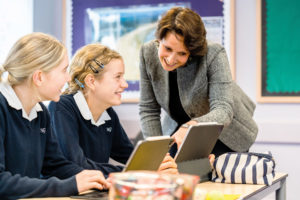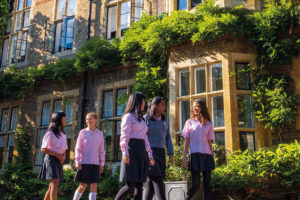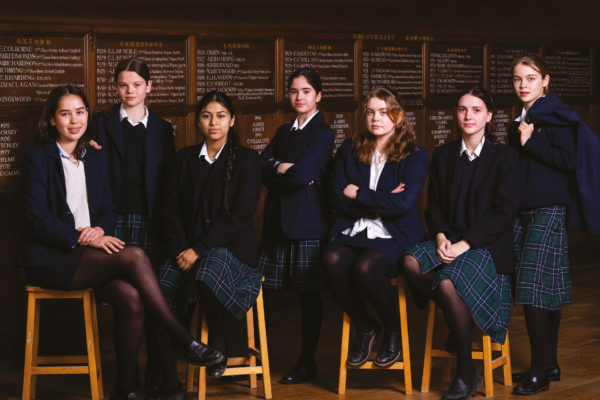Bursaries Are Getting A Boost
By
1 year ago

Schools are making more progress than ever in the quest to create transformational funding, says Elizabeth Ivens
More than £1 billion in fee assistance has come directly from independent schools for the first time, according to the Independent Schools Council (ISC), signalling a growing commitment to widening access. Hand in hand with this, there has been a surge in assessing – or ‘means testing’ – a family’s income before making awards to ensure the right candidates benefit.
Nearly half of all current assistance provided – £494 million – is now means tested, the ISC 2023 census reports.
At Winchester College in Hampshire, a substantial £320 million investment portfolio will see £5 million committed to bursary awards this academic year (from Sept 2023) alone. With an average award of 72 percent of the full fee, the school has a target of 150 bursaries by 2024 – 1 in 5 of its 740 pupils.

Winchester College, Hampshire
‘Over the last 15 years, Winchester has supported over 500 pupils through bursary provision at a cost of nearly £36 million,’ says Bursar Paresh Thakrar. ‘Bursaries will range between 10 percent and 100 percent after means testing and those on a full award can effectively receive over 100 percent as additional support for extras is provided.’
The annual sum for bursary awards is funded by an extraction of 3.5 percent from Winchester’s investment portfolio, he explained, adding: ‘We use this as income to spend on our charitable objectives – including bursaries. Over time, we aim for the portfolio to grow through a combination of investment performance, realisations and further fundraising.’
While only a handful of schools can rely on such hefty endowment pots, many have endowments which are still in their infancy. For others, endowment funds are planned. At Sherborne Girls’ School in Dorset, its foundation was set up in 2015 ‘to formalise the fundraising arm of the school’ and ‘an endowment fund is ‘a long-term goal’ says Katherine Massey, Director of Development and Marketing. ‘We formalised the fundraising strategy to support the development of the school as well as to highlight our social responsibilities – the key one being widening access. Compared to other schools with big endowment funds, we are embryonic in this.’
Major fundraising campaigns for so-called transformational bursaries are also proving extremely successful. At Sherborne Girls’, the school has a target of one full ‘Candlelight’ bursary – reflecting the school’s motto of passing on the light of education – in each year group by its 125th anniversary next year (2024), with six already in place.
Transformational bursaries are also popular with would-be donors, says Director of Development Simon Lerwill at co-ed Marlborough College in Wiltshire, explaining: ‘We did a lot of research and a lot of speaking to potential donors – the transformational bursaries are the ones they are more interested in funding.’
The school launched its first dedicated campaign to fund transformational bursaries – ‘the Marlborough Difference Campaign’ – earlier this year (April 2023). It aims to fund 100 transformational bursaries by 2033, meaning approximately 1 in ten of its 1015 pupils would be on a full bursary. With an estimated cost of £1.5 million to endow a bursary in perpetuity by producing an income of around £40-50k a year, the campaign’s target is £75 million. Like many independent schools, Marlborough was founded with philanthropy at its heart.
‘A lot of the history of independent schools starts with scholars being there for free and over time schools moved away from that but are now trying to re-find their original roots,’ says Lerwill.

Sherborne Girls’ School, Dorset
Meanwhile in London, one of the most generous bursary programmes in the UK – at co-ed Latymer Upper School in Hammersmith – ensures one in four of their new Year 7 intake have some form of fee support, an ambition for the whole school. Bursarial support has nearly tripled over the past decade from 96 pupils to over 280 thanks to the school’s trailblazing Inspiring Minds programme, launched in 2014 to secure funds to finance bursaries in perpetuity.
Kerry Wilson, Partnerships Manager at the Latymer Foundation, said the programme was the most ambitious ever launched by a UK school at that time. ‘It was set up to raise £40 million by our 400th birthday in 2024,’ Wilson says. ‘Our aim has always been the same – to open access to bright children who are academically hitting the right targets but whose families might not have the finances to come here.’ More than 5000 donors have since swelled the coffers with donations of under £100 amounting to over £1 million alone.
While schools say many bursary holders are attracted through word of mouth, dedicated partnership work also plays a significant role. Marlborough College is one school where work with local schools has identified future pupils. The school has an innovative 20 year link-up with a state school in a deprived area of Swindon where it supports a separate lesson plan for able pupils, with 2 or 3 pupils a year coming to Marlborough on a free place as a result.
At Winchester, bright state school children can apply for a Wykeham Award, which provides a full bursary into its co-ed Sixth Form. ‘They are a way of reaching out to those doing GCSEs at UK state schools. In Hampshire, state schools stop at 16 so we are providing another option for those extremely academic pupils,’ commented Paresh Thakrar.
Meanwhile, for nearly two decades, Latymer Upper has worked with many partner schools and, since 2017, has run a Saturday morning ‘Bright Sparks’ programme for Year 5 pupils, mainly from the state sector. This year, 43 students are taking part, says Kerry Wilson, explaining: ‘Bright Sparks was set up to identify bright pupils who would benefit from an independent education. We ask local schools to send 2 or 3 pupils – they will know roughly the academic level we are looking for – and they are typically on pupil premium or free school meals. Pupils take part in fun Maths and Science lessons and are also helped with exam preparation while parents are informed about fee assistance.’
Latymer is one of 33 member schools of the London Fee Assistance Consortium who work together to highlight the availability of free and subsidised places for bright children. ‘Six pupils from last year’s programme joined the school in September,’ says Wilson. ‘Meanwhile some are going to other independent schools.’

Godolphin and Latymer
School, London
At nearby all-girls Godolphin and Latymer, a fellow consortium member, a similar programme called The Bridge is helping 79 children from 34 state schools. The school launched the programme to target some of the most deprived schools in their area.
Head Dr Frances Ramsey explains: ‘The Bridge is about academic enrichment as well as increasing access. It is about us sharing our expertise in teaching able children and giving them that extra advantage. The fact that we do this programme is like waving a big flag saying Godolphin and Latymer are serious about bursaries.’
The programme has also helped potential donors, some of whom help to fund the programme’s estimated £70,000 annual cost, see the difference the school is making. ‘Bursaries can be focused on just the funding and the percentages,’ says Ramsey. ‘Through Bridge, we have managed, I hope, to focus on the children and the opportunities that they can get.’

Marlborough College, Wiltshire
With many millions needed for transformational bursaries, schools have also been looking at increasingly ambitious fundraisers. Marlborough was the first school in the UK to launch its bursary appeal with a Giving Day, involving the entire school community, parents and alumni in a series of challenges. Simon Lerwill said the day was the ‘most successful giving day any UK institution has undertaken’ raising £650,000 which match-funded by a ‘generous donor’ meant the college almost raised enough in one day to fund one bursary in perpetuity.
‘Giving Days started in America and we thought – ‘why not use one as a campaign launch day?’. It generated tremendous excitement, awareness and fun.’
And schools are adamant that the growth in bursaries reflects a social purpose which permeates everything they do. ‘There is a perception that these schools are just for the elite and not very accessible to ordinary pupils,’ says Paresh Thakrar at Winchester. ‘That couldn’t be further from the truth.
‘If you ask a member of staff what they are most proud of – they will say the bursary programme and those opportunities they are providing.’






